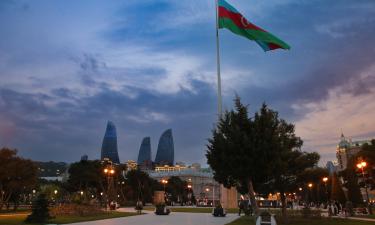Old Tricks of the New Government
"We had to move to a barn and sleep with pigs."
Things have not been working out well for those who had to flee Chechnya leaving behind their homes and all of their belongings. Monetary compensations appeared to be the main problem. In a country such as Russia money issues had always occupied a special niche. The Chechen case appeared to be of no exception with an additional twist. Majority of the refugees are Russians. They blame Russian government for providing Chechens with three times greater compensations for their abandoned possessions.
A wrathful note has been sent to the compensation commission of the Stavropol’s region by Svetlana Meshceryakova and Valerii Brenning of Nevinnomisk. In it they stated, "We refuse to receive such miserable compensation for the loss of our valuable belongings. Russian government places us in the same category as street bums by paying us as little as 130,000 rubles. …The government prioritizes Chechen citizens currently living in Chechnya and pays them as much as 350,000 rubles for destroyed possessions. Aren't we also from Chechnya? We are shocked that we have become victims of discrimination. Our next step will be Russian's Supreme Court where we will fight for our rights and human dignity…"
Stavropol's governor press has reported that such letters become more popular and continue to accumulate at an increasing rate in the regional government.
According to the local immigration committee, the main problem is that of certain restrictions imposed by the government of Russia on April 30, 1997. Paragraph №510 clearly states that "those who had to flee Chechen Republic for good are entitled for compensation for their lost home and/or belongings. According to the 5th clause, everyone is entitled to receive compensation "despite the type of the possession or the actual degree of damage." Taking into account Russia's present day price for a cubic meter in a flat, the entire sum should be "no less than 120 million rubles per family." (The price is indicated in rubles before denomination. Today these are thousands, states "Izvestia")
 "Almost everybody who receives compensation from us poses the same question: what can we buy on this money? A barn?"- stated Urii Kostukov, chief executive of the Immigration Department in the Government Ministry of Internal Affairs of the Stavropol’s region in his interview to "Izvestia". "When first resolution regarding compensations has been published, about six years ago, 120,000 rubles were equivalent $20,000. A cubic meter in a flat at the time cost less than 2,000 rubles. Today, a maximum compensation has increased up to $4,000. A cost per square meter has reached 7,000 rubles."
"Almost everybody who receives compensation from us poses the same question: what can we buy on this money? A barn?"- stated Urii Kostukov, chief executive of the Immigration Department in the Government Ministry of Internal Affairs of the Stavropol’s region in his interview to "Izvestia". "When first resolution regarding compensations has been published, about six years ago, 120,000 rubles were equivalent $20,000. A cubic meter in a flat at the time cost less than 2,000 rubles. Today, a maximum compensation has increased up to $4,000. A cost per square meter has reached 7,000 rubles."
Nowadays, it is almost impossible to acquire decent homes for this money even on the village outskirts. But why didn't those immigrants accept their compensations back in 1997 when it was still possible to buy normal homes in major regions of the country for that money? As it turns out, nobody had given them any.
"Our region is considered record-breaking in the number of Chechen refugees," states chief specialist of the department of refugees in the region's immigration center, Svetlana Lisachenko. "There formed an enormous line in front of our office, after the resolution has been published. People demanded their money. We however, had a rather limited amount from the federal budget. We were able to provide compensations to 800 families per year at first. Today, about 6000 people in the region have already received their compensations. We hope that the line will soon disappear."
As far as Chechnya is concerned, their amounts differ quite considerably from those in the Stavropol’s region. The amount of monetary compensation there has been determined in accordance with the government’s resolution signed on July 4, 2003. The document entitles people to 300,000 rubles for their lost homes, and an additional 50,000 rubles for peoples' lost possessions. Sensing negative reactions from those Russians from Chechnya who have to survive on three times less amount of money than Chechens themselves, Russian Prime Minister Mikhail Kasyanov has announced his decision to make certain corrections in the document regarding the sum of money to be paid. Kasyanov has promised to settle the matter within two months. It has been already four months since the day of his promise and nothing has been done. People are still waiting.
Things are even worse for those who had to flee Chechnya before the first war. A family of a veteran of the WWII Fedor Rusalov, serves as a fine example. Nowadays, they live in the Stavropol’s region in a village called Pelagiada.
"We have left everything behind and moved taking only our children and nephews," states Fedor Vasilievich. "We rented a house on the outskirts. There were sixteen of us in the house. Some time later, we were able to purchase two cows. Daughters soon found jobs. We have been living like this for a long time, until one day the house has burnt down leaving nothing but naked walls. We had no other choice but to move to a nearby barn and sleep with pigs."
The Rusalov's consider that such disaster has actually helped them. His daughter Marina began writing letters to various departments asking for help. As a result, the immigration commission has purchased them a house for 180,000 rubles.
According to the regional immigration commission, those who left Chechnya before December 12, 1994 or after November 23 1996 are not eligible for any compensation.
"The Russia's Supreme Court, however, did indeed consider such document to be illegal and in need of corrections," states Svetlana Lisachenko. "Nevertheless, no corrections have been made yet. And in the meantime, we are not entitled to pay those needy ones who have left Chechnya before the end of the first war."
Nikolai Gritchin,
Stavropol's region
Subscribe to Pravda.Ru Telegram channel, Facebook, RSS!




